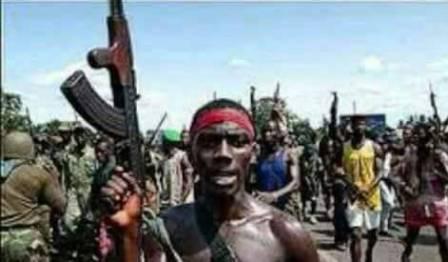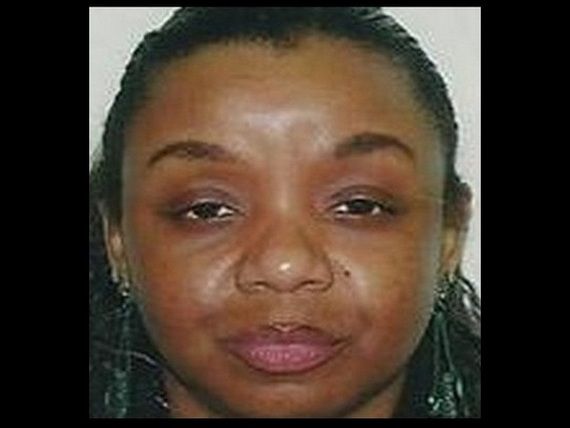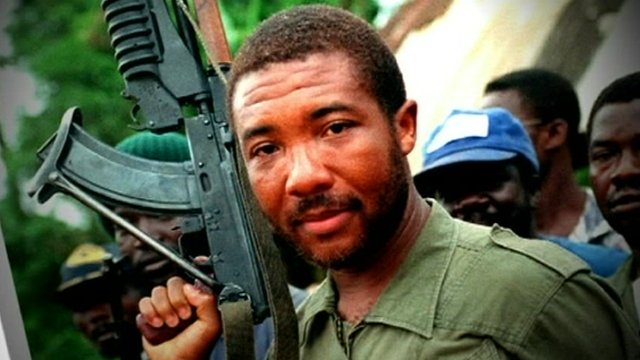As Taylor’s final judgment day looms
Mabinty Kargbo was just 15 years old when Sierra Leonean rebels cut off her hands and killed her parents in front of her during the country’s horrific 11 year war. Now, she waits anxiously to hear whether the former Liberian President, Charles Taylor was behind the rebel crimes as his trial draws to a close in The Hague. (Photo: A young female Sierra Leonean amputee)
“We all want to hear the judgment that the judges will issue, and we hope they execute Taylor, let him die just the way he caused the death of our people in this country. But even when Taylor dies, we will not forget what the rebels did to us. When I look at my hands, and when I wake up in the morning and don’t see my parents, I will always remember the war in this country,” Mabinty, now 26, tells me.
I was in Sierra Leone over the New Year break, wanting to find out what people thought about the high profile trial of Taylor, who has been charged with backing Revolutionary United Front (RUF) rebels, the rebel group that fought an 11 year battle to control the territory and resources of Sierra Leone. The trial has lasted for three years and with prosecutors and defense lawyers set to make their closing arguments from February 8-11, Sierra Leoneans can hope that judges will deliver a final verdict before the end of 2011.
During the closing arguments, Prosecutors hope to tell the judges that Taylor “created, armed, supported, and controlled” the RUF. Prosecutors intend to impress upon the judges that Taylor supplied RUF rebels with materials and manpower and that if it were not for Taylor’s support to the rebels, “the crimes suffered by the people of Sierra Leone would not have occurred.”
Defense lawyers, on their part will stress Taylor’s innocence in their closing arguments. They will argue that RUF rebels might have had dealings with personnel within Taylor’s security apparatus but any such relationships were not with Taylor’s knowledge and support. Defense lawyers will tell the judges that when Taylor eventually had dealings with RUF rebels after he became president of Liberia in 1997, such dealings happened with the consent of other West African leaders and they were only geared towards bringing a peaceful resolution to the conflict in Sierra Leone.
Whatever the parties say to the judges, Sierra Leoneans will be waiting for only one thing—a final determination of whether Taylor is guilty or innocent. If the judges find Taylor guilty, many, like Mabinty, will be anxious to know the sentence he will receive.
Back in Sierra Leone, I had to explain to Mabinty that the Special Court for Sierra Leone will not hand out the death sentence on any convicted person.
Public opinion in Sierra Leone about Taylor is hardly neutral, with a larger percentage of people you speak with pointing fingers at the former Liberian president as being responsible for what the RUF did to the people of that country.
Speaking with people in Sierra Leone over the New Year break, a 46 year old man whose right hand was amputated by rebel forces in January 1999 tells me what it would feel like if he sees Taylor in jail.
“It will be a great day for, not only me, but for the hundreds of Sierra Leoneans who suffered at the hands of the rebels sent by Taylor, if he is sent to jail for the rest of his life,” Lamin Bangura, 46, an amputee says..
At a meeting with university students in Sierra Leone, a bulk of them have a common position—that the fact that Taylor has been subjected to a credible accountability process, whether he is found guilty or not, should bring a measure of satisfaction or justice to victims of the conflict in Sierra Leone.
A prominent Pentecostal Pastor in Freetown thinks otherwise; “I hope Taylor is not released,” he tells me.
On a radio discussion program held to commemorate the January 1999 rebel invasion of Freetown, a man makes reference to an alleged statement by Taylor in 1990, that “Sierra Leone will taste the bitterness of war.”
“So when rebels entered the country, from Liberia, just as Taylor had predicted, who are we to blame?” Yusuf Kargbo, who lives in the East of Freetown, asks.
Kargbo adds that “we all know that RUF rebels reported directly to Taylor, he gave them arms and ammunition to attack us in this country…”
Another man calls into the radio program and says that “we should blame our own Sierra Leonean brothers and sisters for what they did to us during the conflict. Let us stop blaming Taylor. With my senses, if a foreigner tells me to kill my own brother or sister, I will use my own senses to say no way. So let us not blame Taylor.”
I ask Eldred Collins, presently the interim leader of the RUF, what he thinks about allegations of Taylor’s support to the RUF.
“Let us wait for the judges to deliver their judgment,” he tells me.
This is what Sierra Leoneans now await—a determination by Special Court for Sierra Leone judges whether Taylor is guilty or innocent of the charges against him.
Many people you speak with along the streets of Freetown will tell you that the process has taken too long and that all they want to hear now is the judgment.
A university student tells me in Freetown that “if this year comes to an end without a judgment for or against Taylor, we’ll no longer be interested in the trial.”
A taxi driver who survived several rebel attacks during the conflict believes that the Taylor trial must be brought to a close so as to allow Sierra Leoneans to forget about anything that has to do with the war.
“As it is, the major thing that reminds us about the war is when we see the Special Court and know that it is still trying Charles Taylor,” he tells me, as we drive pass the Special Court for Sierra Leone premises in Freetown in January this year.
“We want this thing over with, let the judges tell us if Taylor is guilty or not, and then we can put this all behind us,” he adds.
For Mabinty, however, looking at her arms and not seeing her parents will always remind her about the war. While she will carry the pain of her experiences for a long time, Mabinty believes that ensuring that those responsible for her ordeal are held accountable will still give her a measure of satisfaction.
“We feel like our cries are being heard… we feel like there are people who did not suffer like us but who want to make sure that those responsible for our sufferings are made to answer for their acts and that the same thing does not happen to other people again,” she tells me.
By Alpha Sesay. (Alpha Sesay is a Sierra Leonean lawyer and International Criminal Court-Legal Officer for the Open Society Justice Initiative)
Stay with Sierra Express Media, for your trusted place in news!
© 2011, https:. All rights reserved.







